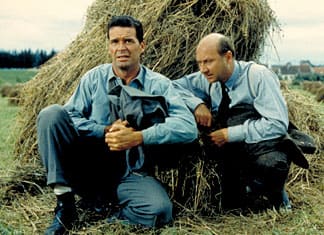The Great Escape, originally released in 1963, is the sort of war movie that easily convinces nine-year-olds and George W. Bush that war's really not that bad. The film is based on a real life POW escape carried out by Allied Air Force officers in WWII Germany. In the film, the camp is touted as being specifically designed to hold a who's who of incorrigible escape artists. It is the cast that portrays this group that holds a lot of the film's appeal. If you like watching male movie stars thrust out their jaws, this is the film for you. Steve McQueen, James Garner, Charles Bronson, Richard Attenborough, James Coburn it's a swagger fest. As soon as these fly boys are deposited behind the barbed wire, they're trying to figure out ways to get under or over it. The majority of the action depicts the preparation for the escape, which was achieved by tunnelling, as a kind of grand boy-scout caper with lots of digging, document forging, clever signals and neat stuff like lanterns made out of old tin cans and dirt displacing bags that fit into one's "trousers." Once the escape is made and 76 men try to flee Germany, things take on a more urgent tone, reminding us that this was a life or death scenario, especially for the 50 men who were caught and executed for their efforts. The quality of the transfer is good and the widescreen format lets the action scroll out nicely. The extras, which extend to a second disc, are informative in an A&E sort of way (who produced most of them). For instance, I would not have known that one of the few survivors and the man who masterminded the tunnels was a Canadian named Wally Flood. The optional audio track also contains some good stuff, like James Coburn describing Steve McQueen as "crazy, crazy in a bizarre sense." Plus: trailers, more. (MGM)
(Headless Heroes)The Great Escape
John Sturges

BY Graham DuncanPublished Jun 1, 2004